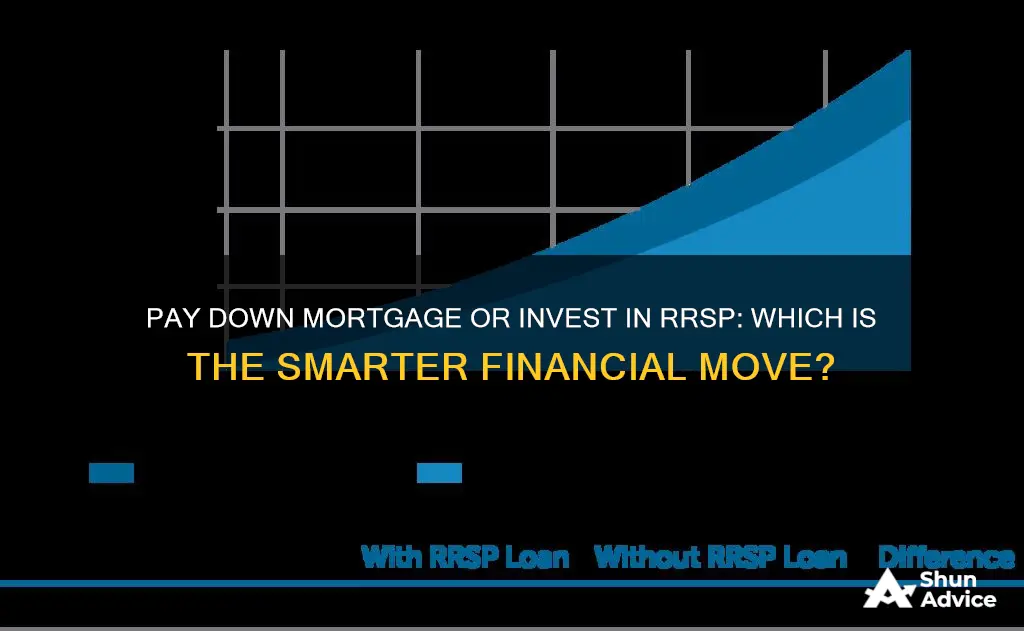
Paying down your mortgage or investing in an RRSP is a common dilemma, and the right answer depends on your individual circumstances. Both are important financial decisions that can impact your retirement and estate. Generally, if your mortgage interest rate is equal to or higher than the rate of return on your RRSP, you may be better off paying down the mortgage first. However, if you can guarantee that the rate of return on your RRSP will be consistently higher than your mortgage interest rate, investing in the RRSP while paying the minimum on your mortgage may result in higher long-term gains.
| Characteristics | Values |
|---|---|
| RRSP | Retirement savings, tax benefits, compound interest, liquidity |
| Mortgage | Monthly expenses, interest rates, debt, financial burden |
| Strategies | Pay down mortgage first, save in RRSP while paying mortgage, balance both |
| Considerations | Age, tax rate, interest rates, investment risk, financial goals |
What You'll Learn

Paying down the mortgage first may be better in the long run
Paying down your mortgage first may be better in the long run. This is especially true if the interest rate on your mortgage is higher than the rate of return on your RRSP. By paying down your mortgage, you are guaranteed savings, whereas investing in an RRSP may require taking on riskier investments to achieve a higher rate of return.
For example, if your mortgage interest rate is 5% and you plan to put your RRSP contribution into a GIC investment that pays 2.5% interest, you would be better off paying down your mortgage first. This is because it costs more than a dollar to pay down a dollar of debt, so the financial benefit of paying down your mortgage is actually higher than the interest rate.
Another factor to consider is your age. If you are older and nearing retirement, paying off your mortgage early can be beneficial. It can help to eliminate one of the biggest monthly expenses in your budget before you retire. On the other hand, if you are younger, it may be better to focus on maximizing contributions to your RRSP to take advantage of tax-deferred growth over time.
Additionally, paying down your mortgage can provide you with more financial flexibility. Once your mortgage is paid off, you can then invest the former mortgage payment into your RRSP, potentially building a substantial nest egg for your retirement. This strategy can also work the other way around: you can contribute to your RRSP first, and then use the income tax savings to pay down your mortgage.
It's important to note that everyone's situation is different, and the best approach will depend on your individual circumstances. Consulting with a financial planner or advisor can help you make the most informed decision based on your financial goals.
The Cost of Filing for Investments: Understanding the Necessary Expenses
You may want to see also

Investing in RRSP first may yield higher returns
Investing in an RRSP before paying down your mortgage may yield higher returns in the long run. This is because contributions to an RRSP are made on a pre-tax basis, offering a tax benefit in the year the money is contributed. The maximum contribution to an RRSP for 2022 is 18% of your earned income, up to $29,210. Unused contribution room can be carried forward to subsequent years. Additionally, money in an RRSP grows on a tax-deferred basis and benefits from compound interest.
The benefit of compound interest in an RRSP is particularly advantageous for younger people, as the tax-deferred compounding of investment returns over time can accumulate a large sum for retirement. If you are older and closer to retirement, it may be better to prioritize paying off your mortgage early to reduce your budget for the years following retirement.
Another factor to consider is the interest rate on your mortgage versus the anticipated rate of return on your RRSP. If your RRSP return is higher than your mortgage interest rate, you would likely be better off investing in your RRSP first. However, if your mortgage interest rate is higher than your anticipated RRSP return, it is generally better to prioritize paying down your mortgage.
It is important to note that everyone's situation is different, and the best strategy depends on individual circumstances. Consulting a financial planner or advisor can help you make the best decision based on your financial goals and priorities.
Markets: The Freeze
You may want to see also

Age and retirement plans are important factors
When deciding whether to pay down a mortgage or invest in an RRSP, age and retirement plans are important factors to consider.
The general consensus is that the younger you are, the more you should prioritise retirement savings over mortgage payments. This is because compound interest will have a more significant effect on your savings the longer it is left to accumulate. Therefore, the earlier you start saving for retirement, the better.
However, if you are approaching retirement age, it may be better to pay your mortgage off more quickly to reduce your budget for the next few years. This is especially true if you have a higher-rate mortgage.
If you have children, it is recommended that you ensure your mortgage is paid off before they enter university, to free up funds for their education.
Additionally, if you are taxed at a high rate, RRSP contributions might be more advantageous than mortgage payments because of the associated tax savings.
Investments: Hold, Sell or Diversify?
You may want to see also

Tax savings and liabilities
When deciding whether to pay down your mortgage or invest in an RRSP, there are several factors to consider regarding tax savings and liabilities.
Firstly, it's important to understand the tax implications of each option. Paying down your mortgage can provide guaranteed savings if the interest rate on your mortgage is higher than or equal to the rate of return on your RRSP. In this case, you may be better off focusing on paying down your mortgage first and then contributing to your RRSP once it's paid off. This strategy ensures that you reduce your overall debt and save on interest payments, which can be tax-deductible in some cases.
On the other hand, investing in an RRSP offers tax advantages as well. Contributions to an RRSP are often tax-deductible, meaning they can reduce your taxable income for that year. Any investment income earned within the RRSP is generally tax-deferred until you make a withdrawal, typically after retirement. This allows your investments to grow tax-free over time. However, when you do make withdrawals from your RRSP, they are usually included in your income and become subject to income tax.
Another factor to consider is your tax rate. If you are taxed at a high rate, contributing to an RRSP may be more advantageous due to the associated tax savings. The higher your tax rate, the more you can benefit from tax deductions and deferrals offered by RRSPs. Additionally, if you are in a higher tax bracket now than you expect to be during retirement, RRSP contributions can help lower your current tax burden.
It's also worth noting that the decision to pay down your mortgage or invest in an RRSP depends on your financial discipline. While it may be ideal to pay off your mortgage before contributing to an RRSP, maintaining the same level of savings for retirement after becoming mortgage-free requires discipline. Many people find it challenging to continue setting aside the same monthly amount for retirement once their mortgage is paid off.
In conclusion, when considering tax savings and liabilities, both paying down your mortgage and investing in an RRSP have their own advantages. Paying down your mortgage can provide guaranteed savings and reduce your overall debt, while investing in an RRSP offers tax deductions and tax-deferred growth. The best option for you will depend on factors such as interest rates, your tax rate, and your financial discipline. Consulting a financial professional can help you make an informed decision that aligns with your financial goals and tax situation.
Sony: Invest Now or Miss Out?
You may want to see also

Liquidity and monthly cash flow
Liquidity refers to how easily an asset can be converted into cash. It is advantageous to hold liquid assets as they are generally associated with lower fees, penalties, or transaction costs when converting to cash. Liquid assets can also provide peace of mind, knowing that one has resources readily available to meet short-term needs.
When it comes to the context of paying down a mortgage or investing in an RRSP, liquidity can play a role in several ways. Firstly, if you choose to pay down your mortgage faster, you are essentially converting your cash into an illiquid asset, as accessing that money again would typically involve refinancing or taking out a home equity loan, which may incur additional costs and interest. On the other hand, investing in an RRSP may provide more liquidity, as you can often withdraw funds early if needed, although this may come with certain restrictions and penalties.
Monthly cash flow is another crucial consideration. Paying down a mortgage faster means committing more of your monthly cash flow to debt repayment, which may impact your ability to cover other expenses or invest in other areas. For example, if you choose to pay an extra $750 per month on your mortgage, that is $750 that you are not contributing to your retirement savings or other investments. This could impact your long-term financial goals and the overall growth of your net worth.
On the other hand, investing in an RRSP may provide tax benefits that can increase your monthly cash flow. Contributing to an RRSP can reduce your taxable income, resulting in a higher tax refund or lower tax bill. You can then use these tax savings to offset your mortgage payments or invest in other areas.
It is important to note that the decision to pay down a mortgage or invest in an RRSP depends on various factors, including interest rates, tax brackets, and individual financial goals. Consulting a financial professional can help you make an informed decision that aligns with your specific circumstances.
Startups: Invest or Avoid?
You may want to see also
Frequently asked questions
Paying down your mortgage can eliminate one of the biggest monthly expenses in a homeowner's budget. If your mortgage carries a high-interest rate, it makes sense to pay it off as quickly as possible.
Contributing to an RRSP can have both short-term and long-term benefits. Contributions to an RRSP are made on a pre-tax basis, offering a tax benefit in the year the money is contributed. The benefit of compound tax-deferred growth within the account may be the biggest benefit of investing in an RRSP.
The answer depends on your individual circumstances. The simplest way to decide is to look at two things: the interest rate on your mortgage and the return rate of your planned RRSP investment. Generally, if your mortgage interest rate is equal to or higher than the rate of return on your RRSP, you would be better off paying down the mortgage.







